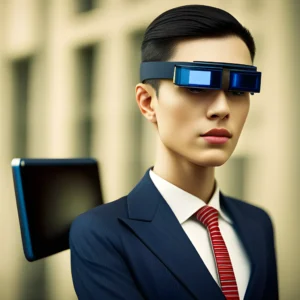Beyond Tomorrow: A Look at the Revolutionary Technology of Future Computer
In today’s fast-paced world, technology continues to evolve at an unprecedented rate. One of the most exciting prospects on the horizon is the future computer technology. As we look ahead, it becomes clear that several key advancements will shape the way we interact with computers. From quantum computing and artificial intelligence (AI) integration to augmented reality, the Internet of Things (IoT), biometric feedback and security, and nanotechnology, the future of computing holds immense potential. However, it also brings forth unique challenges that must be addressed. In this article, we will explore these various aspects and delve into the exciting possibilities that lie ahead.

Features of Future Computer
Quantum Computing
Quantum computing represents a significant leap forward in computational capabilities. Unlike classical computers that use bits, quantum computers leverage quantum bits or qubits. These qubits can exist in multiple states simultaneously, allowing for parallel processing and performing complex computations at incredible speeds. The potential applications of quantum computing are vast, ranging from optimizing complex algorithms and solving intricate mathematical problems to revolutionizing fields like cryptography and drug discovery.
Artificial Intelligence (AI) Integration Revolutionizing Computer Intelligence
Artificial intelligence plays a pivotal role in the future of computer technology. By integrating AI into computing systems, we enable machines to mimic human intelligence, learn from experience, and make informed decisions. From voice assistants and autonomous vehicles to personalized recommendations and medical diagnostics, AI has the potential to transform various aspects of our lives. As AI continues to advance, future computers will become smarter, more intuitive, and capable of understanding and adapting to human needs.
Augmented Reality Blending the Virtual and Physical Worlds
Augmented reality (AR) is another exciting development in the future of computing. AR overlays digital information onto the real world, enhancing our perception and interaction with our surroundings. With the help of advanced sensors and cameras, future computers will enable us to experience immersive augmented reality, revolutionizing industries such as gaming, education, healthcare, and manufacturing. From virtual try-ons to interactive educational simulations, the possibilities are endless.
Internet of Things (IoT)
The Internet of Things refers to a network of interconnected devices that can communicate and share data with one another. In the future, computers will deeply integrated with the IoT, enabling seamless connectivity and automation. From smart homes and cities to industrial automation and healthcare monitoring, the future of computing will rely on the IoT to create a highly connected and intelligent ecosystem. This interconnectedness will enhance efficiency, convenience, and productivity in various domains.
Biometric Feedback and Security
With the increasing reliance on technology, security and authentication become paramount. Future computers will employ advanced biometric feedback and security mechanisms to safeguard user data and protect against unauthorized access. Biometric authentication methods, such as fingerprint scanning and facial recognition, will become more sophisticated and accurate. These measures will ensure that only authorized individuals can access sensitive information, thereby enhancing overall security and privacy.
Nanotechnology
Nanotechnology involves manipulating materials at the atomic and molecular scale. In future computer technology, nanotechnology will play a crucial role in miniaturization and improving performance. Smaller and more powerful components will be developed, leading to faster processors, increased storage capacity, and enhanced energy efficiency. Nanotechnology will enable computers to become more portable, lightweight, and capable of delivering exceptional performance for various applications.
Challenges in Future Computer
As we venture into the realm of future computing, we must also acknowledge the challenges that accompany these groundbreaking advancements. Here are some key challenges that need to be addressed:
Security Concerns
With the increased connectivity and reliance on technology, the potential for cybersecurity threats also grows. Future computers must be equipped with robust security measures to safeguard against hacking, data breaches, and privacy infringements.
Ethical Implications
As AI becomes more prevalent in future computers, ethical considerations come to the forefront. We must ensure that AI systems are designed and implemented in a way that aligns with moral values, respects user privacy, and avoids biases and discrimination.
Interoperability
The integration of various technologies and devices within the future computing ecosystem requires seamless interoperability. Standardization and compatibility protocols need to established to enable smooth communication and interaction between different platforms and devices.
Power Consumption
As computational demands increase, energy efficiency becomes crucial. Future computers should strive for optimal power consumption to minimize environmental impact and reduce reliance on scarce resources.
Education and Skills
The rapid advancement of technology necessitates a corresponding focus on education and skill development. To fully harness the potential of future computers, individuals must be equipped with the necessary knowledge and expertise to utilize and innovate within this evolving landscape.
Advantages of Future Computer
Increased Processing Power
Future computers will harness the power of quantum computing and advanced processors, providing unmatched processing capabilities. This increased processing power will enable faster computations, complex simulations, and data analysis, empowering researchers, scientists, and industries to make groundbreaking discoveries and advancements.
Enhanced Storage Capabilities
With the continuous growth of data, future computers will offer enhanced storage capabilities. Advancements in nanotechnology will lead to smaller yet more spacious storage devices, allowing for the efficient storage and retrieval of massive amounts of data. This will enable individuals and organizations to store and access vast quantities of information seamlessly.
Improved Energy Efficiency
Future computers will focus on energy efficiency, addressing the environmental concerns associated with technology. Through the use of nanotechnology and energy-saving components, future computers will consume less power while maintaining high performance. This will result in reduced energy consumption and a greener approach to computing.
Advancements in Artificial Intelligence
Artificial intelligence will be at the forefront of future AI Supercomputers. The integration of AI algorithms and machine learning capabilities will enable computers to understand, analyze, and interpret data more accurately. This will lead to improved decision-making, personalized experiences, and automation in various domains, from healthcare and finance to transportation and entertainment.
Improved Connectivity
Future computer will be seamlessly connected, allowing for enhanced collaboration and communication. The Internet of Things will enable devices to interact with each other, sharing data and insights in real-time. This interconnectedness will facilitate smarter homes, cities, and industries, improving efficiency, convenience, and overall quality of life.
Increased Cybersecurity Measures
As technology advances, so do the threats and vulnerabilities. Future computers will prioritize cybersecurity, implementing robust measures to protect user data, networks, and systems. Advanced encryption techniques, biometric authentication, and real-time threat detection mechanisms will ensure a secure computing environment.
Revolutionary Interfaces & Interaction Methods
Future computers will revolutionize how we interact with technology. Innovative interfaces, such as augmented reality and gesture-based controls, will offer intuitive and immersive experiences. Voice assistants and natural language processing will enable seamless communication with computers, making technology more accessible and user-friendly.
Final thoughts on future computer
The future of computer technology holds immense promise and potential. With advancements in quantum computing, AI integration, enhanced storage and energy efficiency, improved connectivity, cybersecurity measures, and revolutionary interfaces, we are poised to enter an era of unparalleled possibilities.
Future computers will empower us to solve complex problems, drive innovation across industries, and improve the overall human experience. However, it is crucial to address the challenges that arise along the way, including security concerns, ethical considerations, interoperability, and the need for continuous education and skill development.
By embracing the advancements and proactively mitigating challenges, we can unlock the full potential of future computers and shape a future where technology enhances our lives, fosters sustainable development, and drives positive change.
| If you’ve awakened yourself through this blog, Here are some other blog you would enjoy | |||
| Desktop without cpu | 16gb ram desktop | ||
| SSD for Desktop | father of personal computer | ||
| Refurbished desktop | Benefits of computer for students | ||
| LED Computer | Analog computer vs Digital computer | ||
